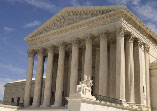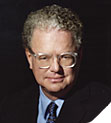| Idaho Sen. Larry Craig isn't sticking to the script about how sex scandals play out in the nation's capital. In fact, he's following it backward. The rich history of powerful figures accused of misbehavior shows they tend to deny it indignantly, try to ride out the storm with tortured explanations, then give in to contrition if cornered. Not Craig. First, an admission of guilt; now, a defiant protestation of innocence. Seeking to salvage his reputation and quell a media storm stirred by his guilty plea to disorderly conduct charges, the Republican senator Tuesday denied making a sexual advance to an undercover officer in a Minneapolis airport men's room two months ago. "I am not gay and never have been," Craig declared at a Boise news conference with his wife, Suzanne, at his side. But even as he denied making an advance, the case sent shock waves through Republican circles. Senate Republican leaders called for an ethics investigation and vowed to consider other sanctions. Former Massachusetts Gov. Mitt Romney, whose Idaho presidential campaign was headed by Craig until the charges came to light, compared the senator's behavior to former President Clinton's encounter with a White House intern and to former Rep. Mark Foley, R-Fla., who resigned last year in a scandal involving male House pages. The charge grew out of a June 11 incident at Minneapolis-St. Paul International Airport in which an officer investigating lewd-conduct complaints about activity in the restroom arrested Craig for allegedly making a sexual advance. The arrest and the senator's Aug. 1 guilty plea became public Monday, when they were reported by the Capitol Hill newspaper Roll Call. Craig, 62, was ordered to pay $575 in fines and fees and given one year's probation. A sentence of 10 days in the county workhouse was stayed. At the news conference, Craig, a leading voice on issues affecting the West and a consistent opponent of gay-rights legislation, apologized for his handling of the incident, saying he regretted his guilty plea. He said he had retained a lawyer to review the plea, although he signed court papers declaring he had read the police report and understood the nature of the crime and paid the fine — which defense experts said would make a challenge difficult. Craig said he pleaded guilty because his hometown newspaper, The Idaho Statesman, had been conducting an eight-month investigation into his sexual orientation. He said he hoped that resolving the case quietly — without telling his family, friends, staff or colleagues — would settle the matter without bringing it to light for what he called the newspaper's "witch hunt."
"I overreacted in Minneapolis, because of the stress of The Idaho Statesman investigation and the rumors it has fueled around Idaho," said Craig, who took no questions. Craig has confronted sexually related accusations before. In 1982, he denied involvement in a congressional-page sex scandal. The Statesman on Tuesday reported on rumors that Craig had engaged in restroom sexual encounters with other men. The newspaper began its inquiry after a gay activist blogger, Mike Rogers, published a claim that Craig had sex with men. Rogers cited anonymous sources. The Statesman quoted an anonymous man who claimed he had sex with Craig in a restroom at Union Station in Washington, D.C. The newspaper, which interviewed 300 people, described other allegations but did not name those who made them. In a May interview that the newspaper published Tuesday, Craig denied having had gay sexual encounters and specifically denied restroom encounters. "I'm going to have to leave it up to other people to weigh the care we took. I'm a bit disappointed" with Craig's complaints, said Vicki Gowler, the newspaper's top editor. "We were quite responsible, and we took great care with the story." Craig already was under pressure from Republicans to give up the seat he has held since 1991 rather than risk handing Democrats what has been a safe seat. He said he'll announce next month whether he will seek re-election. Pressure accelerated Tuesday. The mug shot from Craig's arrest was broadcast on CNN accompanied by a headline: "Senator's Bathroom Bust." The Drudge Report went with the headline "Brokeback Bathroom." And the detailed arrest report was available on the Internet. Greg Smith, an Idaho pollster who has worked for Craig, said it was "almost certain" the senator would not seek re-election. David Adler, a political-science professor at Idaho State University, noted that GOP leaders would be unlikely to support any interest Craig might have in trying to hold his seat "since they would fear losing a seat that has been safe for so long." Adler said Craig's swift resignation as co-chair of Romney's presidential campaign in Idaho provides a "good measure of the fever that has been inflicted." Patrick Sammon, president of the Log Cabin Republicans, the largest organization for gays in the GOP, said Craig's ability to continue serving is "in serious doubt." If Craig resigns, Republican Gov. C.L. "Butch" Otter will appoint a successor, most likely a Republican, to serve the remainder of the term. A former Democratic congressman, Larry LaRocco, is campaigning to replace Craig. LaRocco was elected to the House in 1990 but lost the seat in the 1994 GOP takeover. LaRocco said he believes a Democrat can win even though none has been elected to the Senate from Idaho since Frank Church, who lost the seat in 1980. "People are in a plate-throwing mood out here, regardless of what happened with Larry Craig," LaRocco said. Craig now is fighting a multifront battle, first and foremost a longshot bid to undo his guilty plea and the likely ethics probe, while also trying to shore up support among constituents should he decide to seek a fourth six-year term. In his guilty plea, according to court records, Craig acknowledged engaging in physical "conduct which I knew or should have known tended to arouse alarm or resentment of others." Criminal-defense lawyers said it would be difficult for the senator to have the case reopened. Successful motions to withdraw guilty pleas usually meet a high threshold, such as showing the person was misled into entering the plea, his constitutional rights were violated or there was wrongdoing by prosecutors, Minneapolis criminal-defense lawyer Peter Wold said. But Craig's written plea specified the charges related to the airport incident, that he knew the judge couldn't accept a guilty plea from a person who felt he was innocent and that he was making no claim of innocence. If he's successful in overturning his plea, Craig likely will have to face a public trial, Wold said. |











